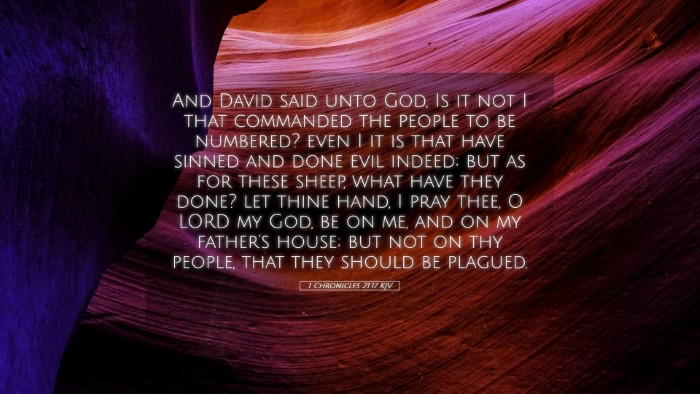Commentary on 1 Chronicles 21:17
Verse Overview: 1 Chronicles 21:17 states, "And David said unto God, Is it not I that commanded the people to be numbered? even I it is that have sinned and done evil indeed; but as for these sheep, what have they done? let thy hand, I pray thee, O LORD my God, be on me, and on my father’s house; but not on thy people, that they should be plagued." This verse arises from a context of sin, judgment, and the mercy of God, offering rich insights for reflection.
Historical Context
The events leading to this moment reflect David's actions in conducting a census of Israel, which was viewed as an act of pride and a lack of trust in God’s power to protect His people. The consequences of this act resulted in a divine judgment that plagued Israel. David's plea in this verse reveals his deep awareness of sin and responsibility for his actions.
Theological Themes
- Sin and Accountability: David acknowledges his direct role in the sin that led to national punishment. This highlights the biblical theme of individual accountability, where leaders are called to be particularly aware of their influence on those they lead.
- God’s Justice and Mercy: The verse captures the duality of God’s nature—His justice in punishing sin, balanced by His mercy in responding to heartfelt repentance. David's request for the judgment to fall on himself and his family reveals a profound understanding of grace.
- The Shepherd's Heart: David's concern for the people further exemplifies the heart of a true leader who sees his people as "sheep." This metaphor underscores the duty of leaders to protect and care for those under their charge.
Insights from Commentators
Matthew Henry
Henry emphasizes the gravity of David’s sin in counting the people, signifying a lapse in faith. He notes that David’s lament and admission of guilt are crucial, as a leader must bear the weight of his follies. Henry points out that true repentance involves a clear acknowledgment of one’s sins and an appeal for mercy not just for oneself but for those affected by one’s actions.
Albert Barnes
Barnes highlights the aspect of judgment upon Israel due to David's sin, showcasing the notion that God holds leaders accountable for their transgressions against divine ordinances. He interprets David’s plea as a heartfelt intercession, revealing a deep sense of responsibility and sorrow over the suffering of innocents. Barnes further explains that this reflects a significant principle: that leaders experience the consequences of their actions, but sincere repentance can lead to divine mercy.
Adam Clarke
Clarke elaborates on the nature of the plague sent by God as a consequence of David’s numbering of the people. He perceives David’s concern as an expression of his pastoral heart, recognizing that the innocent should not share in the burdens of the guilty. Clarke views this moment as a pivotal teaching in biblical leadership, urging leaders to seek God's mercy for their own sins and for the welfare of their people.
Practical Applications
- Leadership Responsibility: This verse serves as a reminder for those in positions of authority to recognize the weight of their decisions. Leaders must operate with integrity, knowing their actions have far-reaching impacts.
- Understanding the Nature of Sin: A faithful acknowledgment of sin is the first step toward restoration. This text encourages individuals and communities to regularly engage in self-reflection and confession.
- Seeking God’s Mercy: David’s approach in pleading for mercy serves as an example for believers today. It teaches that genuine repentance can lead to restoration, showing how one can seek to atone for wrongdoings through sincere prayer.
Conclusion
1 Chronicles 21:17 encapsulates a critical moment in biblical history. It is rich with theological implications about sin, leadership, and divine mercy. The reflections from esteemed commentators such as Matthew Henry, Albert Barnes, and Adam Clarke enrich our understanding of this passage. Ultimately, the verse calls for a profound sense of responsibility in leadership, a deep awareness of one’s own sinfulness, and a compelling need to seek God’s grace for ourselves and for those we lead.


